November 13th, the US State Dept's Deputy Assistant Secretary for Iraq and Iran Bureau of Near Eastern Affairs testified to the House Foreign Affairs Subcommittee on the Middle East and North Africa.
A friend at the US State Dept wanted to know if we were ever going to ever include Brett McGurk's opening remarks in full? Did I need a copy e-mailed?
No, I was there. Thanks though.
For those who've forgotten, Brett McGurk was almost Barack's third ambassador to Iraq. But he had a little scandal. From June 7, 2012, this is
Isaiah's
The World Today Just Nuts "
Standing Behind McGurk" from back in the days when the White House was insisting that they would stand behind Brett.
Stephen Beecroft became the US Ambassador to Iraq instead.
Brett was, of course, one of Bully Boy Bush's most treasured War Hawks during the days Bully Boy Bush occupied the White House. When Barack couldn't get him named Ambassador to Iraq, he gave him the second best thing because Barack is all about the War Hawk, he's all up in it.
Here's Brett McGurk's opening remarks from November 13th:
Chairman [Ileana] Ros-Lehtinen, Ranking Member [Ted] Deutch, and Members of the
Subcommittee, thank you for inviting me to discuss the situation in Iraq.
My
testimony
this afternoon
will focus on our efforts
to safeguard
U.S. interests in this
important country, bearing in mind our obligations to build on all that
America has
sacrificed over the past decade.
It is in the memory of those lost that we continue
to make every effort to move Iraq forward
, and in line with U.S. interests.
The challenges are daunting. Internally and regionally, pressures continue to build
,
exacerbated by a resurgent terrorist network
led
by al Qaida's Iraq
-
based
affiliate,
now known publicly as
the Islamic State of Iraq and the Levant (
AQ/
ISIL). The
next year
in Iraq
may
be pivotal,
particularly
with national elections now set for
April 30, 2014.
I look forward to working closely with this Subcommittee as we
navigate this difficult terrain,
and
ensure
that
core U.S. interests are protected.
Our policy in Iraq is focused on these
core
interests, and
organized
along the
following
five
lines of effort:
1.
Maintaining a unified and federal Iraq
2.
Supporting
increases in production and export of oil resources
3.
Promoting Iraq’s
strategic independence and regional integration
4.
Countering the re-emergence of al Qaida in Iraq
(AQI)
5.
Supporting Iraq’s democratic institutions and trajectory
My testimony will
review our efforts along these
track, measuring progress
from
Secretary Kerry's March 24, 2013, visit to Baghdad.
After that visit, the Secretary
asked me to travel to Iraq, and I have made four
trips since, with another planned
for next week.
I hope
to provide an overview of the situation as
viewed from
Washington, as well as on the ground in Iraq,
where
extraordinary diplomats,
led
by Ambassador [Stephen] Beecroft,
are serving
our nation with courage and distinction
.
This
first
line of effort is focused primarily on relations between Baghdad and
Erbil, the capital of the Iraqi Kurdistan Region (IKR). As a recent study by the
Rand Corporation notes,
tension
between
Arabs and Kurds
has
long been identified
as
among the greatest drivers of instability in Iraq.
Should
these
tensions ever lead
to conflict, it would have dire consequences for U.S. interests
in Iraq and
throughout the region. Accordingly, we have worked for a decade to dampen
potential flashpoints and develop political structures for dispute resolution,
pursuant to the framework established in the Iraqi constitution.
When the Secretary visited Iraq in March, tensions between the IKR and the
central government in Baghdad were at a dangerous boil. Due to a series
of
disagreements
over the Iraqi budget,
and
in the disputed
boundary areas
of
northern Iraq, Kurdish ministers and parliamentarians were
boycotting the central
government, and its Peshmerga forces faced off against Iraqi Army units -- with
both sides daring the
other to open fire.
Fortunately, intensive diplomatic engagement led to a
detente, with both sides
pulling back and disputes returning to the political arena where they belong.
On
June 10
, Prime Minister Maliki visited Erbil for the first time in two years; then, on
July 7, IKR President Barzani visited Baghdad, for the first time since
late 2010.
As a result of these visits, the IKR and the central government established seven
joint committees with mandates to address the most difficult issues
of federalism:
security cooperation, revenue sharing, and balancing powers between the central
and regional governments.
Since then, there has been progress in the area of security cooperation, and we are
working to facilitate serious discussions on revenue sharing, to help ensure that all
Iraqis -- in all parts of Iraq -- benefit
equitably from Iraq's national patrimony. This
is the vision enshrined in the
Iraqi
constitution, and we believe it
is critical to
Iraq's long-term stability. These
revenue sharing
discussions may
intensify in the
weeks ahead, as the Iraqi cabinet,
and then parliament,
begin debate on a
$150
billion national budget.
The U.S. will stand ready to work with all parties, as appropriate, to narrow areas
of disagreement and
build on
areas
of common ground.
Maintaining a united and federal Iraq -- and ensuring the predictability of global
energy markets -- will require sound development and management of Iraq's
abundant natural
resources.
Iraq is estimated to have the fifth-largest proven oil
reserves in the world. Last year, it
surpassed Iran
as OPEC's second-largest oil
producer. It has also surpassed Iran as a leading exporter to India and China,
which has been essential to
enforcing robust international sanctions on Iranian oil
exports,
while also maintaining
market stability.
According to the International
Energy Agency
(IEA),
Iraq
may
account for
nearly half
of anticipated growth in
global
oil
output
over the current decade, with revenues
approaching $200
billion
per year.
In short, Iraq's hydrocarbon sector is vital to U.S. interests in the region, and its
development is
essential
to
Iraq's long-term stability.
These
shared interests have
led to a close
and ongoing
partnership as to how Iraq can best manage its abundant
resources to generate increasing revenues and align the interests of disparate
groups in a unified and federal Iraq. For example, four export platforms that came
on line south of Basra in 2012 -- each with capacity to export
900,000
barrels per
day -- were the result
of joint efforts
beginning in 2007 to address serious
deficiencies in Iraq's infrastructure.
Today, U.S. policy is focused on a similarly ambitious -- and
achievable -- vision: a
strategic pipeline from the super giant oil fields in Basra
(with 80 percent of Iraq's
proven reserves)
to the Haditha refinery
in
Anbar province;
south
west
through
Jordan
to the Red Sea;
and
connected to
the
north
,
Turkey
and the
Mediterranean.
These three export
routes -- the
Arabian
Gulf, Red Sea, and Mediterranean -- will
build
redundancy
into Iraq's national export infrastructure, facilitate prosperity to
all parts of
the country, and align the interests of regional partners in a stable and
prosperous Iraq.
Coupled with this vision is a revenue sharing agreement to ensure that revenues are
shared equitably, and, longer term,
new legislation
to manage
the hydrocarbon
sector and
ensure legal
predictability to market entrants.
The United States wants
to see Iraqi oil from
all
parts of the country -- north to south -- reaching global
markets as soon as possible, and in a manner that reinforce
s
stability. Iraq today
is
producing
3 million barrels-per-day, but the IEA projects under its central scenario
potential
increases to 6 million barrels-per-day by
2020, and 8 million barrels-per-day by 2035, with revenues over this period approaching $5 trillion.
The United States does not take sides in the internal disputes regarding the
distribution of revenues and management of
oil resources. Instead, we focus on the
principles enshrined in the Iraqi constitution and the maxim that it is always better
to peacefully divide a large pie than to fight over a small one. Thus, we are
focused on increasing production and exports, overcoming the hurdles companies
face when operating in Iraq, reducing bottlenecks, and lending technical ex
pertise
as appropriate under our
Strategic Framework Agreement. These efforts will
accelerate over the coming months, including with a joint coordination
committee
on energy cooperation early next year.
Regional tensions have a direct impact on Iraq's internal stability. Political blocs,
leaders, and non-state entities, including militias and terrorist groups, often find
external sponsorship and support. Iraq
also
shares a 400-mile border with Syria,
and a 900-mile border with Iran, which,
we learned from hard experience,
can be
difficult
to control.
Tensions
in recent
years with Turkey,
combined with
lingering
Gulf War era disputes
with Kuwait,
and lack of regular engagement with other
Gulf Cooperation Council states,
threatened to further isolate Iraq -- and thereby
widen the door to nefarious influences from other neighbors.
Beginning in March, the United States launched a quiet but active campaign to
ease tensions with Turkey, settle accounts with Kuwait, strengthen ties to Jordan,
and
accelerate
efforts to
reintegrate Iraq with its Gulf neighbors.
These
efforts
are
important to
bolstering
Iraq's independence, and,
when combined
with economic
and security initiatives,
aligning
its
long-term
interests to ours.
These efforts have seen some success
.
Iraq and Kuwait settled
key
accounts dating
to the 1991 Gulf War, and
in June
the U.N. Security Council voted
unanimously
to
finalize a process to normalize relations between both countries. Two weeks ago,
the Iraqi cabinet voted to open Kuwaiti consulates in Erbil and Basra.
In April, t
he
United States
began
a trilateral process with Iraq
and Turkey, focused
on mutual
interests.
This week, Turkey's Foreign Minister visited Baghdad for the first time
in two years, and both countries
agreed to restore positive relations.
Jordan and Iraq, with our support, are coordinating efforts to develop the pipeline
project from Basra to Aqaba. In July, we began a strategic dialogue with Jordan,
UAE, and Iraq, to focus on mutual interests, including security, energy, and
economic interests. This group will convene again next week in Abu Dhabi, with
the addition
of Egypt. Iraq has also participated in recent regional
military
exercises, including the Eager Lion exercise in Jordan this
past
summer, and the
international mine countermeasures exercise in Bahrain.
While these are positive steps, we continue to emphasize with Iraqi leaders that full
re-integration with Gulf partners will be influenced by Iraq's stance on the conflict
in Syria. Iraq has sought to retain independence, expressing concern from the
beginning about global jihadist groups that operate in the western parts of Iraq and
eastern Syria. While these concerns are legitimate, it is equally legitimate to
question Iraq's independence given Iran's ongoing use of Iraqi
airspace to re-supply the Asad regime. The frequency of flights is down since the
Secretary's
visit in March, but Iraq must do more to tighten its inspection
procedures
.
We also
remain watchful of Iranian efforts to use Iraq to circumvent international sanctions.
Iraq's independence, finally,
can be strengthened
through
ties to the U.S. private
sector. We are working to promote U.S. exports to Iraq and
working with
U.S.
companies -- including Ford, Boeing, General Electric and Citibank -- doing
business in Iraq
.
On September 18, Iraq launched a $357 billion five-year National
Development Plan, with projects identified across multiple sectors: energy,
health,
agriculture,
education and
transportation.
The U.S. embassy provided technical
advice
for
this program, and we hope
where
possible to match U.S. businesses with
Iraqi development needs. This will be a
key
focus of "Iraq Business Week" to be
held here
in February, with Iraq's Minister of Trade leading
the
Iraqi delegation.
Everything I have just mentioned depends on Iraq
stemming
the rising levels of
violence seen over the past
year.
I was present in Iraq during the peak of the civil
war in 2006 and
2007,
and saw first-hand the devastating impact
it
had
on
Iraq's
fragile social cohesion. The violence
made
politics and economic
growth near
impossible, as security became
the first and only demand of the population.
To address the security situation, it is important to precisely diagnose the
source of
the most devastating attacks
. Iraq since the 2003 invasion has never been peaceful.
In 2011 and 2012, among the quietest years on record,
there were
100 attacks per
week, with 4,400 casualties per year. Nearly all of these attacks were perpetrated
by terrorist groups, led by al Qaida in Iraq (AQI). AQI is led
by Abu Bakr al-Baghdadi,
a Specially Designated Global Terrorist
under Executive Order 13224
.
We believe
Baghdadi
fled to Syria last year
, expanding AQI’s base of operation,
and changing its name to the
Islamic State of Iraq and the Levant (
AQ/
ISIL). Baghdadi early this year announced a campaign of terror against Iraq to include
attacks against security services, government targets, and Shi'a civilians. In
March,
AQ/
ISIL launched a coordinated attack with five suicide bombers against
the Iraqi Ministry of Justice
building in Baghdad
. In June, scores of well-trained
and professional fighters assaulted the Abu Ghraib prison
complex,
freeing
hundreds of inmates, including
mid-level
al Qaida leaders. Since then,
we have
seen upwards of
40 suicide bombers per month, targeting play
grounds, mosques,
and
markets,
in addition to government
sites
from Basra to Baghdad to Erbil.
AQ/
ISIL has benefited from a permissive operating environment due to inherent
weaknesses of Iraqi security forces, poor operational tactics, and popular
grievances
, which remain unaddressed,
among the population in Anbar and
Ninewa provinces. It has also benefited from a sanctuary across the porous border
in Syria, control of lucrative facilities
there,
such as
oil wells, and regular
movement of weapons and fight
ers between Syria and Iraq. The suicide bombers,
we believe, are foreign fighters who travel to Syria to join
AQ/
ISIL
,
and are then
directed toward Iraq for operations.
We have defeated this enemy before, through a combination of devastating and
relentless security operations,
and
mobilizing popular forces to isolate
-- and in
some instances, fight -- AQI networks.
Today, we are working with Iraqi political
and security leaders to develop a similarly holistic approach
.
We are also
emphasizing the urgency, as the targeting of civilians in recent months by
AQ/
ISIL
has given rise to
dangerous
calls to reconstitute
Shi'a
militias outside the control of
the Iraqi government.
Thus far, militia activity has been localized, but if suicide
attacks continue,
we
are likely to see increasing calls for self-protection from local
neighborhoods, and more room for militias to develop roots among the population.
While Iraqi security forces will never match what U.S. forces
achieved
at the
height of the war,
they have proven capable of conducting effective operations
when provided sound intelligence. In recent months,
Iraqi civilian and military
leaders
have
increasingly looked to us for advice
and
information sharing.
This is
partly
to ensure -- with pressure from us -- that operations are targeted
and precise,
to avoid detaining innocent civilians. We have made clear to Iraqi commanders
that some of their tactics over the past six months have been self-defeating, and it
is time to draw on the lessons that we learned together five years ago.
Among the central lessons was mobilizing the Sons of Iraq (SOI) to control the
streets and work in coordination with government security forces. This was a
regular topic during Prime Minister Maliki's meetings in Washington two wee
ks
ago, and he pledged to more than double the salaries of the SOI, to flush resources
to areas where
AQ/
ISIL is operating, and to ensure close and regular coordination
between Iraqi security forces, local provincial councils, and tribal structures,
particularly in Anbar and Ninewa provinces.
In turn, we made clear to
Maliki and
other Iraqi leaders
that the fight against
terrorists and militias will require a holistic -- security, political,
economic -- approach
. We believe we
now have a common roadmap for
combatting
this
problem over the coming months, while anticipating inevitable setbacks.
We have
also made clear to Iraqi leaders that they must make extra efforts to protect the
residents at Camp Liberty in Baghdad, while also pressing the international
community to help with this urgent humanitarian situation.
Finally, while security operations
may not be the
lead element of
a holistic
strategy
against
AQ/
ISIL
, they
remain
essential.
In previous efforts with U.S. forces in the
lead, we
worked to ensure
-- through
targeted and relentless military operations -- that AQI could n
ot
establish a sanctuary or staging presence in Iraq. Today, we
believe
AQ/
ISIL
is trying to establish
camps and staging areas in
Iraq's
western
border regions. Iraqi forces are work
ing to target these camps. But they lack the
equipment for relentless and effective operations
in remote areas
, and over the past
few months, we have seen a number of unarmored helicopters shot by heavy
machine guns, and pilots -- who we trained -- maimed and killed.
By way of recent examples, on October 2, an unarmored helicopter providing support to
ground troops on a mission against
AQ/
ISIL targets was downed by heavy machine gun
fire. Four crew members
(2 pilots, 1 gunner, and 1 engineer)
were killed. A week
earlier, two unarmored reconnaissance helicopters providing over-watch for an ongoing
operation were forced to land after being engaged by a concealed PKC machine gun.
Based on our existing relationships with Iraqi pilots, reviews of operations
have
generally
confirmed
proficiency and
adherence to rules of engagement.
By working with
Congress
,
we furth
er believe that sales of U.S.
equipment will strengthen a long-term
strategic relationship with the Iraqi military -- th
rough training, spare parts, joint
exercises,
logistics, and interoperability with U.S. forces and regional partners.
Time
may not be
on
our side. Iraq has acute demands, money to supply those
demands, and while it prefers U.S. equipment and the multi-decade relationship
that comes with our foreign military sales program, strategic competitors are now
lining up to meet Iraqi demands
if
we
cannot deliver. Case in point is the delivery
earlier this
month of four Russian Mi
-
35 attack helicopters.
We believe that it is
in
America's strategic interest to supply
military
systems
to Iraq
, as opposed to
Russia or other competitors, and we look forward to working with Congress to
address all outstanding questions with respect to
foreign military sales
.
Shortly after Prime Minister Maliki's return to
Iraq
last week, the parliament broke
a deadlock to enact the law to govern national elections in 2014. These elections
are now set for April 30, 2014. This will be the third election for a full-term
national parliament, but the first since the departure of U.S. forces in 2011. Thus,
it is
a critical test of Iraq's democratic process, and we have made clear to all Iraqi
contacts that the elections must be on time, well prepared, and designed to produce
a genuine and credible result.
Our Embassy team is working closely with the
United Nation
s Assistance Mission for Iraq (UNAMI) and the Independent High
Electoral Commission (IHEC) to ensure preparations remain on track.
Iraq earlier this year held provincial elections in
14
provinces, and parliamentary
elections in the IKR
. Results of these elections have shaken local power dynamics.
Prime Minister Maliki's State of Law coalition, for example,
secured pluralities in
Baghdad and Basra,
but was then outmaneuvered in formation of local councils
and lost governorships.
In the IKR, the Patriotic Union of Kurdistan (PUK) lost
ground to the upstart Gorran party, which came in second behind the dominant
Kurdistan Democratic Party (KDP), led by IKR President Massoud Barzani.
In the Sunni majority provinces of Ninewa and Anbar, provincial elections
had
been delayed due to security concerns. We were clear from the outset that this
decision was unwise, and pushed to ensure the elections
took place, which they did
on June 20. The outcome
led to a
status quo in Ninewa, with the brother of
Speaker Osama
Nujaifi retaining the governorship; but new leaders emerged in Anbar, and
these new leaders,
with our encouragement,
are engaging
the central
government.
Prime Minister Maliki met the new Anbar Governor, Ahmad Khalaf
al-Dulaimi, before traveling to Washington, and we expect to see additional
meetings soon, with a focus on coordinating security and political efforts.
At the national level, we are engaged with political leaders, parties, and blocs, to
facilitate progress in parliament
on
a package of laws that are necessary to address
legitimate grievances of the Sunni community.
First in this package is ending once
and for all the process known as "de-Ba'athification," which has grown so
politicized that it now encourages the very forms of intolerance it was intended to
root out.
We are encouraged by a law that passed the cabinet earlier this year with
a time limit on the de-Ba'athification process, but the law has since stalled in
parliament, and at present lacks support from any Shi'a or Kurdish blocs -- each of
whom want to add measures to address the concerns of their own communities.
We will continue to encourage all sides to find a compromise to pass this important
law, as we did most recently with respect to the election law. At the center of these
efforts will be Prime Minister Maliki, who, as the leader of the country, has
responsibility to govern inclusively, and to build bridges from his Shi’a
constituency to Sunnis and Kurds, even where doing so might engender political
risk and backlash.
For Iraq to progress, he must lead.
There have been some encouraging signs at the national level, such as a 14-point
Charter of Social Peace signed in September by leaders across the religious and
political spectrum. This document, while symbolic, calls on
its signatories to
combat "militias and terrorists and all dimensions" -- e.g.,
by addressing grievances
that allow extremists to take root. It further calls on appropriate delegation of
authority to provincial and local leaders, as well as arrangements to
address the
crimes of the Ba'ath Party, without impugning ordinary citizens who may have had
tangential party connections.
It will take generations for Iraq to overcome its legacy of dictatorship, wars, and
isolation. We must be realistic about what is achievable. At the same time, we
must continue to press all sides to compromise on issues that continue to divide
Iraq
. Where the leaders come together, such as through the Social Peace
accord
,
we will exert every effort to
seize the opportunity
and press
for concrete outcomes.
Where they remain apart, we will continue
our efforts
to narrow areas of
disagreement.
In the end, the Iraqi people will have an opportunity to hold their
national leaders accountable with elections now less than six months away.
 PA Nouri al-Maliki
PA Nouri al-Maliki

 اعلام الربيع العراقي
اعلام الربيع العراقي
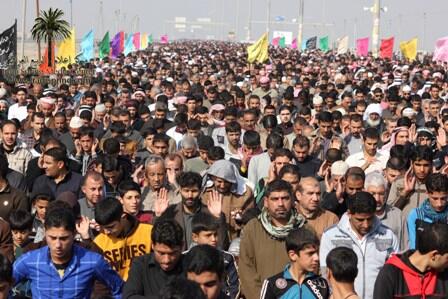
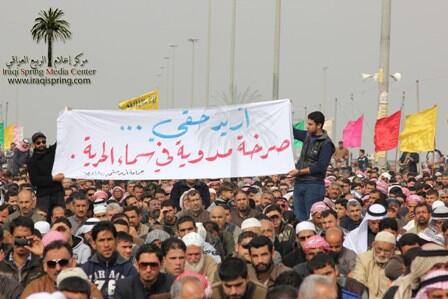
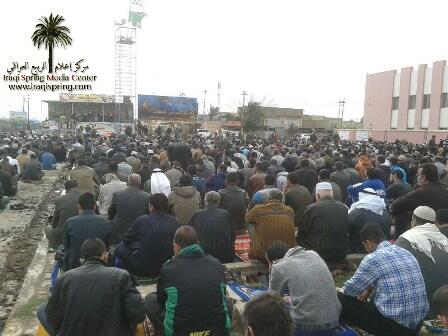
 Aymenn J Al-Tamimi
Aymenn J Al-Tamimi
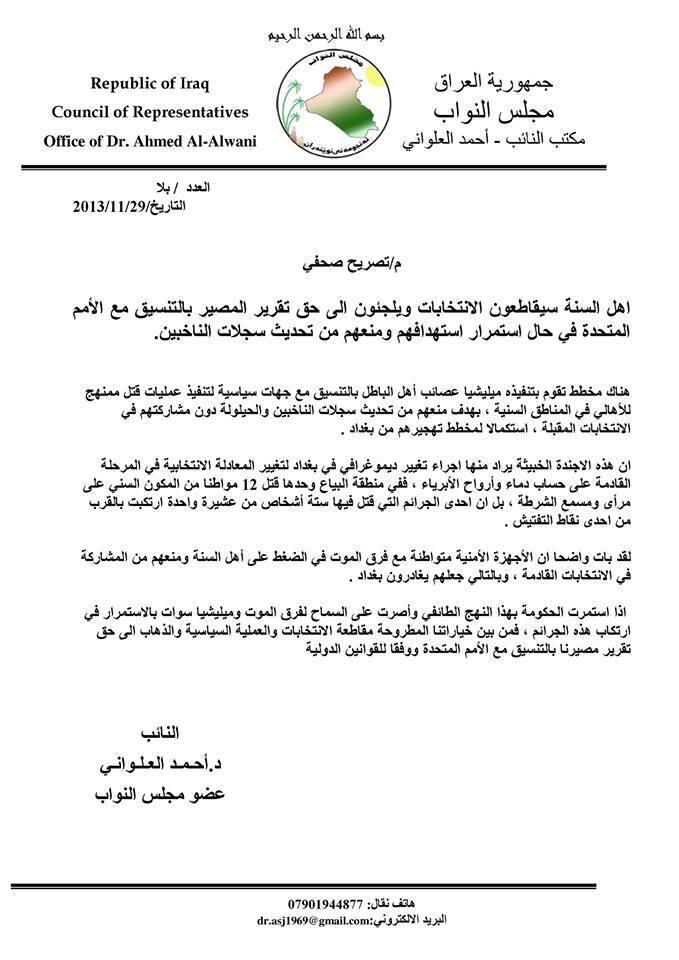
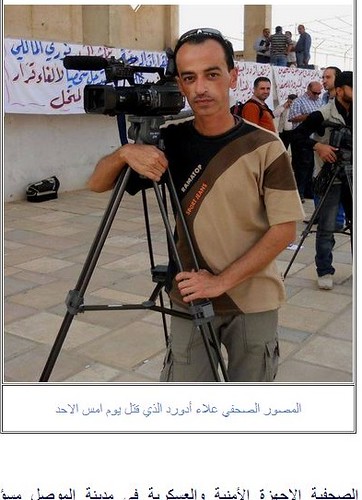
 WatchingaBuzz
WatchingaBuzz